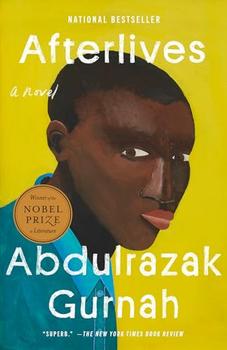Summary | Excerpt | Reviews | Beyond the Book | Readalikes | Genres & Themes | Author Bio

A Novel
by Abdulrazak Gurnah1
Khalifa was twenty-six years old when he met the merchant Amur Biashara. At the time he was working for a small private bank owned by two Gujarati brothers. The Indian-run private banks were the only ones that had dealings with local merchants and accommodated themselves to their ways of doing business. The big banks wanted business run by paperwork and securities and guarantees, which did not always suit local merchants who worked on networks and associations invisible to the naked eye. The brothers employed Khalifa because he was related to them on his father's side. Perhaps related was too strong a word but his father was from Gujarat too and in some instances that was relation enough. His mother was a countrywoman. Khalifa's father met her when he was working on the farm of a big Indian landowner, two days' journey from the town, where he stayed for most of his adult life. Khalifa did not look Indian, or not the kind of Indian they were used to seeing in that part of the world. His complexion, his hair, his nose, all favored his African mother but he loved to announce his lineage when it suited him. Yes, yes, my father was an Indian. I don't look it, hey? He married my mother and stayed loyal to her. Some Indian men play around with African women until they are ready to send for an Indian wife then abandon them. My father never left my mother.
His father's name was Qassim and he was born in a small village in Gujarat which had its rich and its poor, its Hindus and its Muslims and even some Hubshi Christians. Qassim's family was Muslim and poor. He grew up a diligent boy who was used to hardship. He was sent to a mosque school in his village and then to a Gujarati-speaking government school in the town near his home. His own father was a tax collector who traveled the countryside for his employer, and it was his idea that Qassim should be sent to school so that he too could become a tax collector or something similarly respectable. His father did not live with them. He only ever came to see them two or three times in a year. Qassim's mother looked after her blind mother-in-law as well as five children. He was the eldest and he had a younger brother and three sisters. Two of his sisters, the two youngest, died when they were small. Their father sent money now and then but they had to look after themselves in the village and do whatever work they could find. When Qassim was old enough, his teachers at the Gujarati-speaking school encouraged him to sit for a scholarship at an elementary English-medium school in Bombay, and after that his luck began to change. His father and other relatives arranged a loan to allow him to lodge as best he could in Bombay while he attended the school. In time his situation improved because he became a lodger with the family of a school friend, who also helped him to find work as a tutor of younger children. The few annas he earned there helped him to support himself.
Soon after he finished school, an offer came for him to join a landowner's bookkeeping team on the coast of Africa. It seemed like a blessing, opening a door to a livelihood for him and perhaps some adventure. The offer came through the imam of his home village. The landowner's antecedents came from the same village in the distant past, and they always sent for a bookkeeper from there when they needed one. It was to ensure someone loyal and dependent was looking after their affairs. Every year during the fasting month Qassim sent to the imam of his home village a sum of money, which the landowner kept aside from his wages, to pass on to his family. He never returned to Gujarat.
That was the story Khalifa's father told him about his own struggles as a child. He told him because that is what fathers do to their children and because he wanted the boy to want more. He taught him to read and write in the roman alphabet and to understand the basics of arithmetic. Then when Khalifa was a little older, about eleven or so, he sent the boy to a private tutor in the nearby town who taught him mathematics and bookkeeping and an elementary English vocabulary. These were ambitions and practices his father had brought with him from India, but which were unfulfilled in his own life.
Excerpted from Afterlives by Abdulrazak Gurnah. Copyright © 2022 by Abdulrazak Gurnah. Excerpted by permission of Riverhead Books. All rights reserved. No part of this excerpt may be reproduced or reprinted without permission in writing from the publisher.
Your guide toexceptional books
BookBrowse seeks out and recommends the best in contemporary fiction and nonfiction—books that not only engage and entertain but also deepen our understanding of ourselves and the world around us.